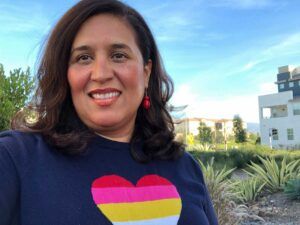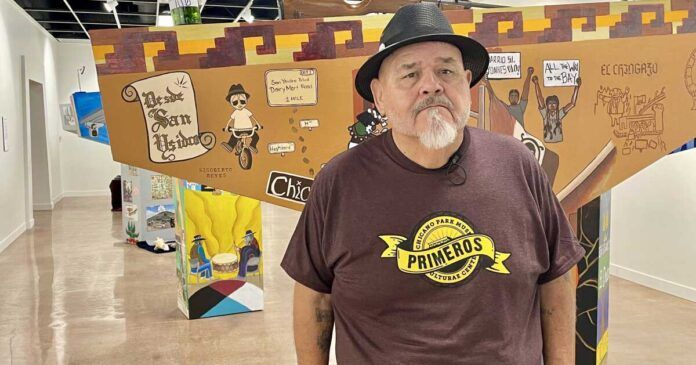The Nancy Jamison Fund for Social Justice honored six individuals for their impact of social justice work in their communities.
The Nancy Jamison Fund for Social Justice awards $50,000 in unrestricted funding to two local leaders advancing racial equity and social justice in San Diego County.
The fund opened nominations in October 2023 and closed them December 30, 2023. More than 200 nominations were received. Six finalists met with the entire Grants Committee for in-depth conversations, and from there, two recipients were chosen. In addition to the two recipients, the four finalists each received $5,000 awards in recognition of their outstanding efforts.

Two South Bay advocates were recognized out of the four finalists.
“Nancy Jamison believed in the power of individuals in our region to make a difference. True to the passion of the fund’s namesake, the NJFSJ celebrates the people behind the work,” said Katie Janowiak, Senior Vice President of Strategy & Impact at Catalyst of San Diego & Imperial Counties, the fiscal sponsor of the fund in a press release.
The top two recipients of the $50,000 award were Dr. Thao Ha, a professor at MiraCosta College, who was instrumental in establishing the college’s Transitions Program for formally incarcerated students reintegrating into an academic environment. Her mentorship in the Rising Scholars network empowered countless individuals to redefine their post-incarceration journeys, and as co-founder of the Oceanside Justice Coalition, resulted in local law enforcement policies.
Also in the top two honorees, Proyecto Trans Latina co-founder Jamie Arangure provided advocacy on both sides of the U.S. – Mexico border. Championing LGBTQ and gender nonconforming immigrants, since co-founding Proyecto Trans Latina in 2018, Arangure built a community-driven, grassroots movement to protect the wellbeing and rights of Trans Latina immigrants on both sides of the border.
Finalist Leticia Ayala of Chula Vista, receiving a $5,000, award was recognized for her past 25 years of coordinating with the Environmental Health Coalition policy development and advocacy, community outreach, direct services, and education around lead poisoning prevention, working to protect the most children most vulnerable to lead exposure, protecting thousands of San Diego children from the irreversible impacts of lead poisoning. Central to her work at EHC, Ayala trains and deploys community organizers to reach vulnerable communities through door-to-door outreach as well as in schools and through local health providers — conducting healthy home assessments, coordinating blood testing, and connecting families to resources for remediation. Beyond outreach and direct services, Ayala advocates and collaborates with local authorities to prioritize lead hazard control in the homes and workplaces of vulnerable families. She has collaborated with decision-making bodies to advance multiple policies protecting children’s health, such as California’s law to ban lead in candy and mandate testing. Ayala is also keenly aware of the need to leverage diverse resources to meet community needs: to date she has assisted the San Diego region in securing more than $10 Million in federal funding to advance regional environmental health priorities.
From San Ysidro, finalist Rigoberto Reyes was honored for his dedication in empowering communities in the border region. Born and raised in San Ysidro, his passion for activism was galvanized by the national Civil Rights Movement and the work of César Chávez, inspiring him to join the historic takeover of Chicano Park in 1970 as a high schooler. It was the first of many forays into the struggle for social justice within San Diego’s Chicano community. Over the course of his 40-year nonprofit career with Via International, Reyes rose to become a deeply respected leader on both sides of the border.
Early in his career, Reyes led Via’s promotora training program in Tijuana and Mexicali, Mexico. He crossed the border daily to support the formation of leadership groups, emphasizing personal development, self-reliance, and community development. Reyes supported the mostly female participants as they worked to support family nutrition, employment, higher education, and small businesses in their communities. In San Diego, Reyes brought these strategies to local Chicano youth in Logan Heights and beyond. A pillar of the Chicano Park community, he has actively supported the Chicano Park Steering Committee, the grassroots organization that curates the largest collection of Chicano murals in the United States. Reyes has launched food security programs, nutrition and ecology training, small business incubation services, and cultural programming that centers Chicano activists, artists, advocates, and entrepreneurs.
From City Heights, Finalist Mikaiil Hussein was honored for his social justice work which began in 2009, when he and hundreds of local taxi drivers went on strike seeking respect and economic justice as immigrant workers. Hussein helped to establish United Taxi Workers of San Diego in pursuit of fair policies and economic justice for the region’s drivers, of which more than 50 percent are African immigrants. In these efforts, he sought to set an example for African immigrant communities for how to advocate, educate, organize, and empower for social and economic justice, all while also prioritizing multi-ethnic unity to overcome historical barriers among drivers. Hussein garnered policy and economic wins while building bridges with labor and law enforcement.
From Del Mar, Finalist Andrea St. Julian is a builder of leaders, institutions, and coalitions dedicated to social justice in San Diego communities. While serving on the Pillars of the Community board of directors, St. Julian was instrumental in establishing a coalition of individuals and nonprofits in San Diego that would launch a Participatory Defense community organizing model. one designed to engage community as partners with their defense in the court system and as active participants in challenging unfair criminal justice systems. She mentored coalition members, prompted the community to own and value their work, and consistently positioned those “closest to the pain” as having the most vital voices. San Diego now boasts one of the most robust hubs for Participatory Defense in the nation. An attorney by training, she served as president of the Earl B. Gilliam Bar Association, where she encouraged Black attorneys to work hand in hand with the community in tackling unjust systems.

